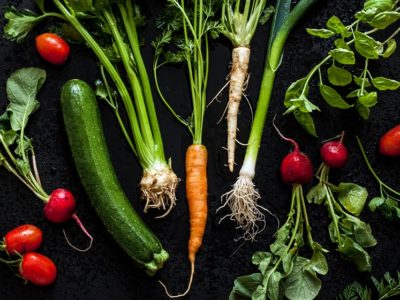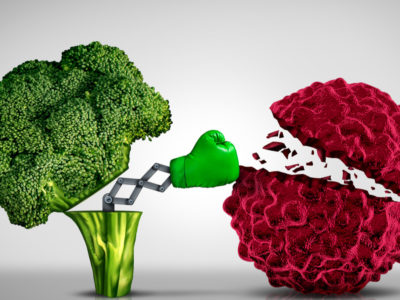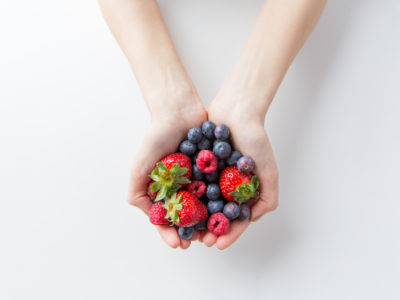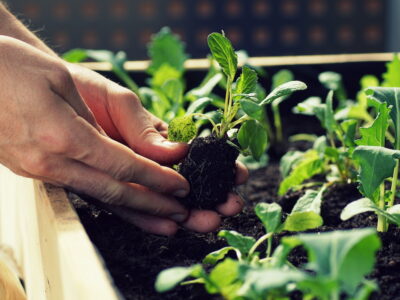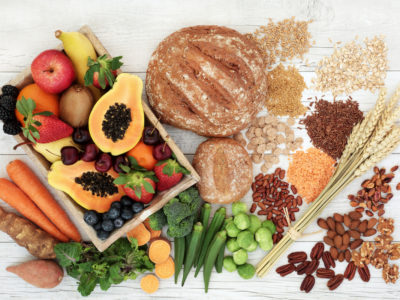Table of Contents[Hide][Show]
Mother always said to eat your greens to grow big and strong. Simple enough, right? Well, yes and no.
While we know veggies are generally a good idea, there are always specific questions that seem to come up:
- Are all veggies created equal or should we be eating certain kinds more than others?
- What’s so great about leafy greens?
- And for goodness sake, what about the pesticides?
Knowing a little more about the type of vegetables you’re eating can help you better tailor a custom nutritional plan for our individual dietary goals. Here’s a quick guide on the finer points of eating those veggies.
1. Eat the rainbow!
According to a study by the founding directors of the UCLA Center for Human Nutrition, Dr. David Heber and Dr. Susan Bowerman, different colored vegetables provide different health benefits. Let’s take a deeper look at why you should eat the rainbow!
Lycopene From Red and Purple Veggies
Specifically, red-purple veggies like tomatoes, purple cauliflower, and red cabbage are abundant in lycopene, which may help reduce the risk of prostate cancer. These vegetables are also full of powerful antioxidants called anthocyanins that may help protect against coronary heart disease and various cancerous cells.
Zeaxanthin and Lutein From Yellow-Green Veggies
Yellow-green veggies like corn, bell peppers and assorted leafy greens carry an abundance of zeaxanthin and lutein. Zeaxanthin and lutein are powerful antioxidants found in the retina that may help reduce the risk of eye diseases like macular degeneration.
Beta-carotene From Orange Veggies
Orange veggies like carrots, squash and pumpkin are good sources of beta-carotene. Beta-carotene helps reduce the risk of acquiring cataracts and may help prevent cancerous cells from forming.
Bile Acid Binding Nutrients From Green Veggies
Green veggies like broccoli, Brussels sprouts, and asparagus have nutrients that bind bile acids. Bile acid is found in all mammals. Unfortunately, bile acid on its own increases cholesterol levels and heightens the risk of cancer. When bile acids bind, they are kept from recirculating through the stomach, which in turn helps prevent the increase of cholesterol and risk of cancer.
Related
The Undeniable Link Between Diet and Cancer
This article explores how diet and cancer are connected, which foods you should eat to fight or even prevent cancer, and which foods you should avoid.
Folate From Dark Leafy Green Veggies
Dark leafy greens like collard greens, kale, and spinach are known to be great sources of folate, which Dr. Susan Bowerman and Dr. David Heber deem vital to our health in their article, “Applying Science to Changing Dietary Patterns,” in The Journal of Nutrition.
Folate is a natural vitamin found in these dark leafy greens that help build red blood cells. A deficiency in folate can be detrimental to your health and can lead to anemia.
Dr. Lynn Bailey, Dr. Gail Kauwell, and Dr. Gail Rampersaud, from the Institute of Food and Agricultural Sciences at the University of Florida, have found a direct correlation between folate deficiency and colorectal cancer as well as with cervical cancer, as reported in their article, “Relationship of Folate to Colorectal and Cervical Cancer,” in the Journal of the American Dietetic Association. According to the American Cancer Society, colorectal cancer is the third leading cause of cancer-related death in the United States. And about 4,300 women are expected to die from cervical cancer this year, according to the American Cancer Society’s 2023 statistics.
So folate is some serious stuff! Unfortunately it is commonly neglected, and many suffer from folate deficiency.
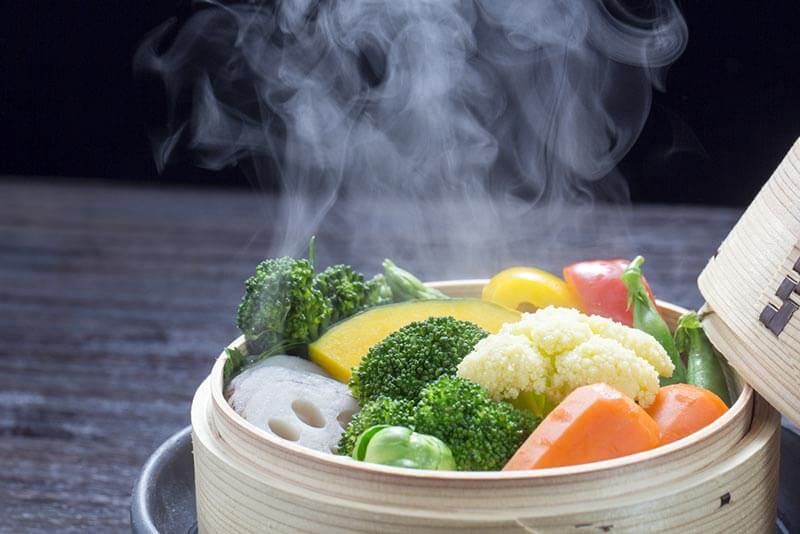
2. How you cook your veggies makes a difference.
Bailey, Kauwell, and Rampersaud found that folate is reduced in dark leafy greens when stir-fried, microwaved, or boiled. Dark leafy greens aren’t always the first to be drooled over when we’re hungry. So we tend to cook vegetables in a way that satisfies our tastebuds, unknowingly degrading their nutritional value. Even people eating dark leafy greens regularly can have a folate deficiency because they are improperly preparing them!
However, these three nutrition experts as well as three members of the Agriculture Research Service team of the U.S. Department of Agriculture have found through their studies that steaming dark leafy greens does not reduce folate. ARS members Dr. Talwinder Kahlon, Dr. Mei Chen Chiu, and Dr. Mary Chapman conducted a study on the importance of steaming collard greens, spinach, kale, and other dark leafy greens when cooking them. They found that steaming vegetables maintains folate and actually improves bile acid binding. So incorporating a plentiful amount of steamed vegetables into your diet can increase your health.
3. Watch out for the starch.
Have you ever wondered why french fries are so easy to eat in excess? Beyond the fact that they are a vessel for high salt intake, they are full of starch.
When digested, starch is broken down into sugars and fat. This raises your blood sugar levels then quickly drops them. Fluctuating blood sugar levels can induce hunger, making you want to eat more than you would have initially. High blood sugar levels typically produce high insulin levels, which allow starch to easily convert to fat.
By monitoring your consumption of starchy foods like potatoes, you can help keep your waist size from increasing.
4. Know where veggies rank in terms of pesticides.
The Environmental Working Group offers a regular Shopper’s Guide to Pesticides in ProduceTM. Its 2023 Dirty Dozen lists the following produce with the highest amounts of pesticides this year:
- Strawberries
- Spinach
- Kale, collard and mustard greens
- Peaches
- Pears
- Nectarines
- Apples
- Grapes
- Bell and hot peppers
- Cherries
- Blueberries
- Green beans
Pesticide Action Network is a great resource for finding out what pesticides are used on foods, including chlorpyrifos, a common pesticide found on bell peppers, kale, asparagus, cucumbers, spinach, as well as many other vegetables, fruits, and nuts.
The best thing you can do is have an action plan. Either because of pricing or availability, organic veggies may not be an option 100 percent of the time. Dr. Carl Winter, food toxicologist at UC Davis commented that “it’s the dose that makes the poison.” Winter suggests washing the veggies to help rid of some of the pesticide residue. Otherwise your best bet is to buy organic at local farmers markets, or better yet, grow your own organic home garden.
You May Also Like…
S

